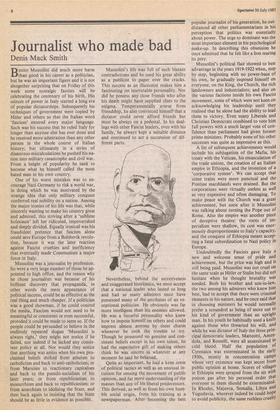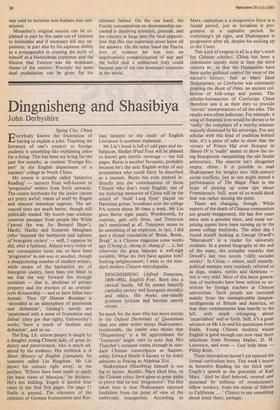Journalist who made bad
Denis Mack Smith
D enito Mussolini did much more harm .1...)than good in his career as a politician, but he was an important figure and it is not altogether surprising that on Friday of this week some nostalgic fascists will be celebrating the centenary of his birth. His seizure of power in Italy started a long era of popular dictatorships. Subsequently his techniques of government were copied by Hitler and others so that the Italian word `fascism' entered every major language. Such was his success that he ruled Italy for longer than anyone else has ever done and he received more admiration than any other person in the whole course of Italian history; but ultimately in a series of disastrous miscalculations he pushed his na- tion into military catastrophe and civil war. From a height of popularity he sank to become what he himself called the most hated man in his own country.
One of his worst mistakes was to en- courage Nazi Germany to risk a world war, in doing which he was motivated by the strange idea that only military conquest conferred real nobility on a nation. Among the major ironies of his life was that, while sincerely wanting to make his country great and admired, this striving after a 'sublime holocaust' left her ridiculed, impoverished and deeply divided. Equally ironical was his fraudulent pretence that fascism alone could save Europe from a Bolshevik revolu- tion, because it was the later reaction against Fascist cruelties and inefficiency that eventually made Communism a major force in Italy.
Mussolini was a journalist by profession. So were a very large number of those he ap- pointed to high office, and the reason why he chose journalists was because of his brilliant discovery that propaganda, in other words the mere appearance of political success, could be as effective as the real thing and much cheaper. If a politician was a good showman, if he could control the media, Fascism would not need to be meaningful or consistent or even successful, provided it could be made to seem so. If the people could be persuaded to believe in the endlessly repeated slogan 'Mussolini is always right,' they might not notice if he failed, nor indeed if he lacked any consis- tent policy at all. Nor would they notice that anything was amiss when his own pro- claimed beliefs shifted from atheism to catholicism and back to anti-catholicism; or from Marxism to reactionary capitalism and back to the pseudo-socialism of his later years; or from republicanism to monarchism and back to republicanism; or from anarchism to idolising the State, and then back again to insisting that the State should be as little in evidence as possible. Mussolini's life was full of such blatant contradictions and he used his great ability as a publicist to paper over the cracks. This success as an illusionist makes him a fascinating yet inscrutable personality. Nor did he possess any close friends who after his death might have supplied clues to the enigma. Temperamentally averse from friendship, he also convinced himself that a dictator could never afford friends but must be always on a pedestal. In his deal- ings with other Fascist leaders, even with his family, he always kept a suitable distance and continued to act a succession of dif- ferent parts.
Nevertheless, behind the secretiveness and exaggerated histrionics, we must accept that a national leader who lasted so long and had so many admirers must have possessed many of the attributes of an ex- ceptional politician. He obviously was far more intelligent than his enemies allowed. He was a forceful personality who knew how to impose himself on others and could impress almost anyone by sheer charm whenever he took the trouble to try. Though he possessed no genuine and con- sistent beliefs except in his own talent, he had the superlative gift of making others think he was sincere in whatever at ,any moment he said he believed.
Quite as important, he had a keen sense of political tactics as well as an unusual in- tuition for sensing the movement of public opinion, and far more understanding of the masses than any of his liberal predecessors. This derived, as well as from his own hum- ble social origin, from his training as a newspaperman. After becoming the best popular journalist of his generation, he out- distanced all other parliamentarians in his perception that politics was essentially about power. The urge to dominate was the most important element in his psychological make-up. In describing this obsession he once admitted that he felt like a lion tearing its prey.
Mussolini's political flair showed to best advantage in the years 1919-1922 when, step by step, beginning with no power-base of his own, he gradually imposed himself on everyone, on the King, the Church, the rich landowners and industrialists; and also on the various factions inside his own Fascist movement, some of which were not keen on acknowledging his leadership until they realised that he alone had the ability to lead them to victory. Even many Liberals and Christian Democrats combined to vote him full powers with a much larger vote of con- fidence than parliament had given former prime ministers. Probably none of his other successes was quite as impressive as this.
A list of subsequent achievements would include his subjugation of the Mafia, his treaty with the Vatican, his emasculation of the trade unions, the creation of an Italian empire in Ethiopia, and the invention of a 'corporative system'. We can accept that some trains were more punctual and the Pontine marshlands were drained. But the corporatipns were virtually useless as well as very expensive and often damaging. To make peace with the Church was a great achievement, but soon after it Mussolini was talking about turning the Pope out of Rome. Also the empire was another piece of deceptive theatre: the roots of im- perialism were shallow, its cost was enor- mously disproportionate to Italy's capacity, and the conquest of Ethiopia meant accep- ting a fatal subordination to Nazi policy in Europe.
Undoubtedly the Fascists gave Italy a new and welcome sense of pride and achievement, but the price was high and is still being paid. Mussolini was not cruel on the same scale as Hitler or Stalin but did not hesitate when he thought brutality was needed. Both his brother and son-in-law, the two among his admirers who knew him best, had to accept that there were criminal elements in his nature, and he once said that in choosing ministers he would normally prefer a scoundrel as being of more use to his kind of government than an upright man. In his youth he habitually used a knife against those who thwarted his will, and while he was dictator of Italy the three prin- cipal democratic leaders, Matteotti, Amen- dola, and Rosselli, were all assassinated in cold blood. Half the population of Cyrenaica was exterminated in the early 1930s, mostly in concentration camPs whose very existence was kept secret from public opinion at home. Scores of villages in Ethiopia were sprayed from the air with poison gas after his personal order that everyone in them should be exterminated. In Rhodes, Majorca, Somalia, Libya and Yugoslavia, wherever indeed he could hope to avoid publicity, the same ruthless cruelty
was used to terrorise non-Italians into sub- mission.
Mussolini's original success can be ex- plained in part by this same use of violence to intimidate and if necessary kill any op- ponents; in part also by his supreme ability as a propagandist in creating the myth of himself as a Nietzschean superman and the illusion that Fascism was the dominant theme of the century. Precisely the same dual explanation can be given for his ultimate failure. On the one hand, the Fascist concentration on showmanship suc- ceeded in deceiving ministers, generals, and the country at large into the fatal supposi- tion that this one superman alone knew all the answers. On the other hand the Fascist love of violence led him into an anachronistic romanticisation of war and the belief that a militarised Italy could become one of the two dominant countries in the world.







































 Previous page
Previous page